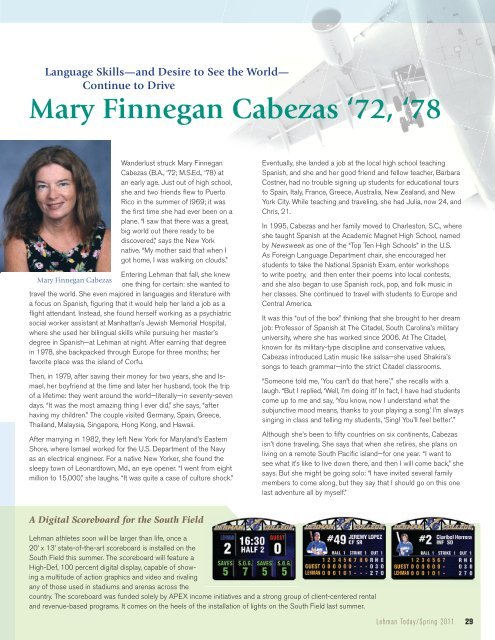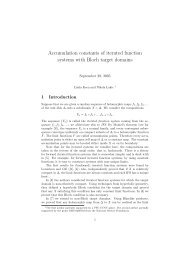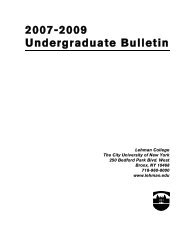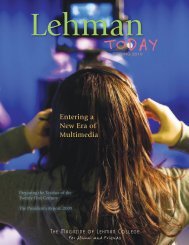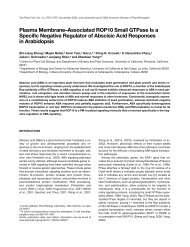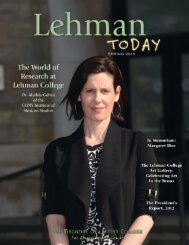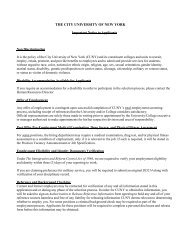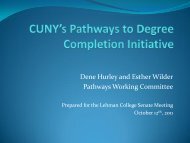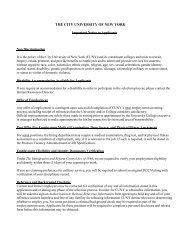Create successful ePaper yourself
Turn your PDF publications into a flip-book with our unique Google optimized e-Paper software.
Language Skills—and Desire to See the World—<br />
Continue to Drive<br />
Mary Finnegan Cabezas ‘72, ‘78<br />
Wanderlust struck Mary Finnegan<br />
Cabezas (B.A., ‘72; M.S.Ed., ‘78) at<br />
an early age. Just out of high school,<br />
she and two friends flew to Puerto<br />
Rico in the summer of l969; it was<br />
the first time she had ever been on a<br />
plane. “I saw that there was a great,<br />
big world out there ready to be<br />
discovered,” says the New York<br />
native. “My mother said that when I<br />
got home, I was walking on clouds.”<br />
Entering <strong>Lehman</strong> that fall, she knew<br />
Mary Finnegan Cabezas<br />
one thing for certain: she wanted to<br />
travel the world. She even majored in languages and literature with<br />
a focus on Spanish, figuring that it would help her land a job as a<br />
flight attendant. Instead, she found herself working as a psychiatric<br />
social worker assistant at Manhattan’s Jewish Memorial Hospital,<br />
where she used her bilingual skills while pursuing her master’s<br />
degree in Spanish—at <strong>Lehman</strong> at night. After earning that degree<br />
in 1978, she backpacked through Europe for three months; her<br />
favorite place was the island of Corfu.<br />
Then, in 1979, after saving their money for two years, she and Ismael,<br />
her boyfriend at the time and later her husband, took the trip<br />
of a lifetime: they went around the world—literally—in seventy-seven<br />
days. “It was the most amazing thing I ever did,” she says, “after<br />
having my children.” The couple visited Germany, Spain, Greece,<br />
Thailand, Malaysia, Singapore, Hong Kong, and Hawaii.<br />
After marrying in 1982, they left New York for Maryland’s Eastern<br />
Shore, where Ismael worked for the U.S. Department of the Navy<br />
as an electrical engineer. For a native New Yorker, she found the<br />
sleepy town of Leonardtown, Md., an eye opener. “I went from eight<br />
million to 15,000,” she laughs. “It was quite a case of culture shock.”<br />
Eventually, she landed a job at the local high school teaching<br />
Spanish, and she and her good friend and fellow teacher, Barbara<br />
Costner, had no trouble signing up students for educational tours<br />
to Spain, Italy, France, Greece, Australia, New Zealand, and New<br />
York City. While teaching and traveling, she had Julia, now 24, and<br />
Chris, 21.<br />
In 1995, Cabezas and her family moved to Charleston, S.C., where<br />
she taught Spanish at the Academic Magnet High School, named<br />
by Newsweek as one of the “Top Ten High Schools” in the U.S.<br />
As Foreign Language Department chair, she encouraged her<br />
students to take the National Spanish Exam, enter workshops<br />
to write poetry, and then enter their poems into local contests,<br />
and she also began to use Spanish rock, pop, and folk music in<br />
her classes. She continued to travel with students to Europe and<br />
Central America.<br />
It was this “out of the box” thinking that she brought to her dream<br />
job: Professor of Spanish at The Citadel, South Carolina’s military<br />
university, where she has worked since 2006. At The Citadel,<br />
known for its military-type discipline and conservative values,<br />
Cabezas introduced Latin music like salsa—she used Shakira’s<br />
songs to teach grammar—into the strict Citadel classrooms.<br />
“Someone told me, ‘You can’t do that here’,” she recalls with a<br />
laugh. “But I replied, ‘Well, I’m doing it!’ In fact, I have had students<br />
come up to me and say, ‘You know, now I understand what the<br />
subjunctive mood means, thanks to your playing a song.’ I’m always<br />
singing in class and telling my students, ‘Sing! You’ll feel better’.”<br />
Although she’s been to fifty countries on six continents, Cabezas<br />
isn’t done traveling. She says that when she retires, she plans on<br />
living on a remote South Pacific island—for one year. “I want to<br />
see what it’s like to live down there, and then I will come back,” she<br />
says. But she might be going solo: “I have invited several family<br />
members to come along, but they say that I should go on this one<br />
last adventure all by myself.”<br />
A Digital Scoreboard for the South Field<br />
<strong>Lehman</strong> athletes soon will be larger than life, once a<br />
20’ x 13’ state-of-the-art scoreboard is installed on the<br />
South Field this summer. The scoreboard will feature a<br />
High-Def, 100 percent digital display, capable of showing<br />
a multitude of action graphics and video and rivaling<br />
any of those used in stadiums and arenas across the<br />
country. The scoreboard was funded solely by APEX income initiatives and a strong group of client-centered rental<br />
and revenue-based programs. It comes on the heels of the installation of lights on the South Field last summer.<br />
<strong>Lehman</strong> Today/<strong>Spring</strong> <strong>2011</strong> 29


